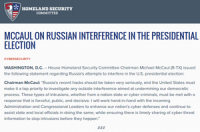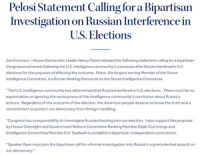-
Why Huawei security concerns cannot be removed from U.S.-China relations

Huawei’s role in building new 5G networks has become one of the most controversial topics in current international relations. The U.S. is exercising direct diplomatic pressure to stop states from using the Chinese telecoms giant. The U.S. government regards Huawei as a clear and present danger to national security and argues that any ally opting for Huawei will compromise vital intelligence sharing among these countries in the future.
-
-
Protecting American Votes and Elections Act of 2019
The PAVE Act requires paper ballots and statistically rigorous “risk-limiting” audits for all federal elections – two measures recommended by experts in a National Academies of Sciences 2018 report. Election security experts who focus on the engineering, computing, and statistical aspects of election security expressed their support for PAVE. “Paper ballots and risk limiting audits are the only known viable approaches for ensuring that software and hardware attacks cannot alter election results,” said one expert. “As the threats to our elections increasingly includes sophisticated foreign adversaries, it is especially important that these simple, proven safeguards be universally implemented.”
-
-
The mainstreaming of conspiracy theories
Is paranoia running rampant? Are believers getting the upper hand? The idea that the moon landing was fake is too exotic for most of us. But who truly believes that global warming is a hoax, or that dark forces rule the world? Quite a few people, according to a researcher of conspiracy theories.
-
-
How are conspiracy theories adopted, and what are their risks?
Why do people adopt conspiracy theories, how are they communicated, and what are their risks? A new report examines these questions, drawing on research in psychology, information engineering, political science, and sociology.
-
-
Russia is targeting Europe’s elections. So are far-right copycats.
Less than two weeks before pivotal elections for the European Parliament, a constellation of websites and social media accounts linked to Russia or far-right groups is spreading disinformation, encouraging discord and amplifying distrust in the centrist parties that have governed for decades. Matt Apuzzo and Adam Satariano write in the New York Times that the activity offers fresh evidence that despite indictments, expulsions and recriminations, Russia remains undeterred in its campaign to widen political divisions and weaken Western institutions. “The goal here is bigger than any one election,” said Daniel Jones, a former F.B.I. analyst and Senate investigator. “It is to constantly divide, increase distrust and undermine our faith in institutions and democracy itself. They’re working to destroy everything that was built post-World War II.”
-
-
Why are the U.S.'s cyber secrets getting stolen? Because China’s getting better at stealing them.
The New York Times published a major story last week, drawing on research from the cybersecurity company Symantec. Ben Buchanan writes in Lawfare that the story revealed how a group of elite Chinese hackers known as APT3 had apparently gained access to powerful American hacking tools and used them to penetrate governments and companies of American allies. The Times piece and much of the commentary it solicited linked this case to concerns about the National Security Agency’s (NSA’s) ability to protect its most closely guarded and powerful capabilities.
-
-
Russia has Americans’ weaknesses all figured out
What are Americans supposed to think when their leaders contradict one another on the most basic question of national security—who is the enemy? Is Russia the enemy, or was the investigation of Russia’s interference in the 2016 election just a slow-motion attack on the president and his supporters? Are Russian fake-news troll farms stirring up resentment among the American electorate, or are mainstream-media outlets just making things up? Jim Sciutto writes in Defense One that U.S. military commanders, national-security officials, and intelligence analysts have a definitive answer: Russia is an enemy. It is taking aggressive action right now, from cyberspace to outer space, and all around the world, against the United States and its allies. But the public has been slow to catch on, polls suggest, and Trump has given Americans little reason to believe that their president recognizes Russia’s recent actions as a threat.
-
-
Report reveals scale of Russian interference in European democracy

Evidence of the Kremlin-backed Internet Research Agency’s long-term interest in European politics and elections has been revealed in two new studies. while Russian involvement in the 2016 U.S. presidential election has been well documented, far less has been known about the Internet Research Agency’s European operations, until now.
-
-
Hysteria over Jade Helm exercise in Texas was fueled by Russians, former CIA director says

Gov. Greg Abbott’s decision in 2015 to ask the Texas State Guard to monitor a federal military exercise prompted significant criticism. A former CIA director said Wednesday that the move emboldened Russians to next target elections.
-
-
U.S. official: Executive order not needed to ban Huawei in U.S. 5G networks

“We have grave concerns about the Chinese vendors because they can be compelled by the National Intelligence Law in China as well as other laws in China to take actions that would not be in the interests of the citizens of other countries around the world. Those networks could be disrupted or their data could be taken and be used for purposes that would not be consistent with fundamental human rights in those countries,” says Robert Strayer, deputy assistant secretary of state for cyber and international communications and information policy.
-
-
Suspected Russian spy whale may have been a therapy whale
The docile beluga whale which appeared in Norwegian waters may have previously served as a child therapy animal in Russia. There had been speculation in the media and in military circles that the harness-wearing whale was a Russian navy spy.
-
-
“A lot of people are saying”: Conspiracies without theories
Russell Muirhead and Nancy L. Rosenblum are professors of government at, respectively, Dartmouth and Harvard. A few years ago, they found themselves, in their words, “startled into thought.” Yes, they knew, crazy ideas were a fixture of American life. But not this crazy. “The subject required more detailed and thoughtful interpretation,” the two write at the beginning of A Lot of People Are Saying: The New Conspiracism and the Assault on Democracy. Elizabeth Kolbert writes in the New Yorker that among the differences between “classic” conspiracy theories and the new conspiracism is their constituencies. Historically, Muirhead and Rosenblum maintain, it’s been out-of-power groups that have been drawn to tales of secret plots. Today, it’s those in power who insist the game is rigged, and no one more insistently than the so-called leader of the free world.
-
-
Facebook removes more pages, accounts linked to “inauthentic” Russian operators

Facebook said it has removed more pages and accounts that are believed to have originated in Russia and were involved in “coordinated inauthentic behavior.”
-
-
Agents of deceit: Russian disinformation institutions and actors

There is a burgeoning Western literature on Russian policy and practice in disinformation, but very little of it has detailed and reliable material about the government agencies and affiliated actors that promote it. A new, detailed report investigates the institutions and actors involved in Russian disinformation.
-
-
The Russia investigation will continue
Special Counsel Robert Mueller’s Russia probe is over, but the FBI is almost certain to continue its counterintelligence investigation into Russian espionage efforts related to the 2016 election. The FBI will continue to search for Americans working on behalf of the Kremlin. John Sipher writes in The Atlantic that the inability to establish that the Trump campaign conspired in a “tacit or express” agreement with the Russian government is not surprising. Most espionage investigations come up empty unless and until they get a lucky break. That does not mean there was no espionage activity in relation to the 2016 election. Every previous Russian political-warfare campaign was built on human spies. Russian “active measures”—propaganda, information warfare, cyberattacks, disinformation, use of forgeries, spreading conspiracies and rumors, funding extremist groups and deception operations—rely on human actors to support and inform their success. Counterintelligence professionals must doubt that Russia could have pulled off its election-interference effort without the support of spies burrowed into U.S. society or institutions.
-
- All
- Regional
- Water
- Biometrics
- Borders/Immig
- Business
- Cybersecurity
- Detection
- Disasters
- Government
- Infrastructure
- International
- Public health
- Public Safety
- Communication interoperabillity
- Emergency services
- Emergency medical services
- Fire
- First response
- IEDs
- Law Enforcement
- Law Enforcement Technology
- Military technology
- Nonlethal weapons
- Nuclear weapons
- Personal protection equipment
- Police
- Notification /alert systems
- Situational awareness
- Weapons systems
- Sci-Tech
- Sector Reports
- Surveillance
- Transportation
Advertising & Marketing: advertise@newswirepubs.com
Editorial: editor@newswirepubs.com
General: info@newswirepubs.com
2010-2011 © News Wire Publications, LLC News Wire Publications, LLC
220 Old Country Road | Suite 200 | Mineola | New York | 11501
Permissions and Policies
Editorial: editor@newswirepubs.com
General: info@newswirepubs.com
2010-2011 © News Wire Publications, LLC News Wire Publications, LLC
220 Old Country Road | Suite 200 | Mineola | New York | 11501
Permissions and Policies
